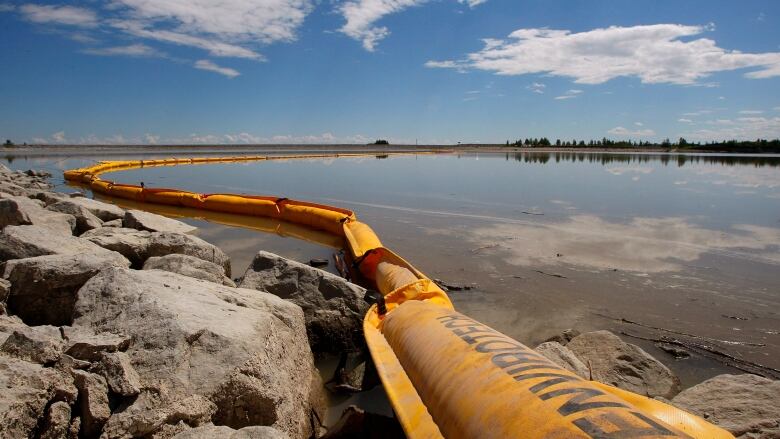Plains Midstream fined $1.3M after guilty plea
Critics say fine is too low for spills that leaked close to 5 million litres of oil

A pipeline company has been fined afterpleading guilty in two spills that sent a total of nearly five million litres of oil into Alberta rivers and wetlands.
Plains Midstream Canada faced three environmental charges in acourtroom in Red Deer, Alta., on Tuesday and was ordered to pay atotal of $1.3 million for the spills, one of which was the secondlargest in Alberta history.
"We made a commitment to address the impacts resulting from the Rainbow and Rangeland incidents, and this settlement is reflective of that commitment," said the company in a statement.
"We sincerely regret that the incidents happened. We are committed to operating our pipelines safely.We continue to improve our pipeline safety through industry-leading investments in people, technology and programs."
Greenpeace spokesman Mike Hudema said the figure represents about five hours worth of profit for Plains All American, the company thatowns Plains Midstream, which has about 1,250 employees in Canada.
"A $1.3-million fine for Plains Midstream is hardly a signal tothe company or Alberta's problem-plagued pipeline industry that theyneed to start solving their ongoing spill issues," he said.
Little Buffalo leak
According to an agreed statement of facts, a poorly welded andhighly stressed section of the 48-year-old Rainbow pipeline crackedon April 28, 2011. About 4.5 million litres of oil leaked intolow-lying marshlands near the northern Alberta community of LittleBuffalo.
Only the lucky location of a beaver dam prevented the oil fromflowing beyond the low-lying spot where the leak occurred.The beaver did not survive.
"A beaver dam was present that stopped the vast majority (andprobably all) of the oil from escaping," said the statement.
The statement describes the damage as significant, although smallin area. A chemist with the Alberta Energy Regulator reported thatthe cleanup had been successful, and that frogs and insects hadreturned to the site by the following year.
Although school in Little Buffalo was cancelled for several daysover odour concerns, "no information exists to show if anyone inthe area was at risk of any harm or suffered any health effects,"the statement says.
"The Rainbow release appears to have resulted in relativelylittle effect to humans due to the remoteness of the release
point."
The pipeline was shut down for 122 days before it was allowed toreopen.
The board then responsible for overseeing Alberta pipelines citedthe company for not properly digging the pipeline, for inadequate operating and maintenance and for inadequate leak detection andresponse.
Plains Midstream was ordered to assess all of its other pipelinesof the same type.
Red Deer River spill
The company also pleaded guilty to a June 2012 spill into the RedDeer River near the community of Sundre in central Alberta. Under the pressure of water flows more than 10 times normal, a length ofthe 48-year-old Rangeland pipeline running underneath the riverfailed.
Several Sundre residents went to hospital with respiratorycomplaints. People with homes along that stretch of river had toleave. Five members of one family were taken to hospital and otherswere not able to return to their homes for weeks.
Gleniffer Lake, a downstream reservoir popular with anglers andboaters, was closed for three weeks at the height of summer.Drinking water in the area was also affected.
Report critical of company's action
A report by Alberta's energy watchdog released earlier this yearwas critical of the company's actions.
The regulator concluded Plains Midstream didn't inspect itspipeline often enough and didn't pay enough attention to governmentwarnings. It also said the company failed to enact adequatemitigation measures once the leak occurred and communicated poorlywith hundreds of people affected by the spill.
Although dead fish and wildlife were found in the area, theagreed statement of facts says "no cause of the death of suchwildlife was conclusively determined."
Alberta Environment reports in the statement that the company'scleanup of the Rangeland leak was "exemplary."
The section of pipe that failed has since been abandoned.
With files from CBC












_(720p).jpg)


 OFFICIAL HD MUSIC VIDEO.jpg)
.jpg)



























































































